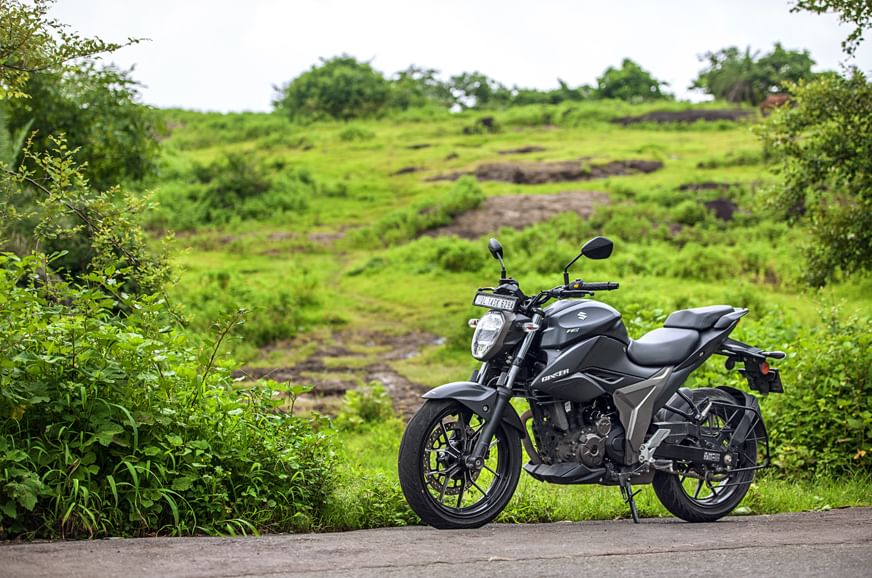Suzuki Gixxer 250 review, test ride
A decently powerful engine, comfortable ergonomics and a neat design make the Gixxer 250 an impressive motorcycle.
Published on Sep 20, 2019 07:00:00 AM
64,345 Views
What is it?
We first experienced Suzuki’s all-new 250cc platform at the Buddh International Circuit earlier this year and it left us pleasantly satisfied. That motorcycle was the fully faired SF250, but these types of bikes may not be everyone’s cup of tea. A naked bike, though, is easier to live with, and appeals to a wider audience – and the Gixxer 250 is that motorcycle. Here’s what we think after spending a couple of days with it.
You have the option of two matte-finish colour schemes with the Gixxer 250. The first is a matte silver with a matte black tank, and the second is an all-black scheme. Both colour schemes are a lot more subtle than the colours and graphic schemes the previous-gen Gixxers were available in. Differently styled wheels and a bronze-coloured mid-section and engine casing are arguably the only parts that keep this 250 from being a little too inconspicuous. Colour schemes aside, everything else is in common with the new Gixxer 155.

The front end has been heavily revised compared to the SF 250, and while it loses the fairing, it gains a rather quirky-looking LED-headlight. The lack of a fairing also exposes the smooth engine case that is devoid of fins. This is something seen usually on liquid-cooled engines, but Suzuki has managed this neat and smooth design on its oil-cooled engine and it does give it a more expensive look. Moving onto the rear, the entire tail section with its split seats is carried over from the SF250, and this is the sportiest-looking angle on the bike. Overall, the Gixxer 250 is a muscular, good-looking motorcycle and the fact that the handlebar, tank and tail lie on the same plane gives it a great stance.
What is it like to ride?
We’ve already experienced the new 249cc, single-cylinder, oil-cooled engine on the SF250 and it remains unchanged here. Peak output figures are 26.5hp produced at 9,000rpm and 22.6Nm of torque that comes in at 7,500rpm. These are decent numbers, but our favourite part is the punchy mid-range that makes city commutes good fun. It feels like a large chunk of the maximum power and torque is at your disposal after 5,000rpm, and the bike pulls all the way to the redline with compelling pace.
We put the Gixxer through our standard testing process and the bike got to 60kph from a standstill in a respectable 3.46sec, while 100kph took 9.39sec. The brakes are good too; they may not be the best in terms of feel or feedback, but a sub-16m halt from 60kph is impressive.
Moving on, the chassis setup is the same as on the fully faired SF250 and the complete package is one that’s great for our riding conditions. The suspension is a bit on the stiffer side but the soft seat balances that out, resulting in a decently comfortable ride. The ergonomics are upright with the footpegs set slightly back, giving you a mildly sporty yet commanding riding position. And it’s in this regard that the naked Gixxer outdoes the SF250 – whether you’re crawling through traffic or entering a corner at speed, the bike feels very easy to handle.
Should I buy one?
The Gixxer 250 isn’t as loud or attention-grabbing as some funky orange or green- coloured bikes in the same price bracket, but it’s still a motorcycle you should seriously consider. Not because it’s exceptionally good at something, but because it’s very capable at a number of things – it’s quick, comfortable, and does a terrific job at being a commuter, while offering performance that will keep you entertained.
Its closest rival, in terms of price and performance, is the lower capacity KTM 200 Duke (Rs 1.62 lakh) that may be almost 8 years old now but is still an intoxicating thriller of a machine. The Gixxer offers a strong, but more sedate riding experience that’s more on par with its 250cc rivals – it sits in between the considerably less powerful FZ25 (Rs 1.36 lakh) and the expensive KTM 250 Duke (Rs 1.97 lakh).
The original Gixxer was a splendid motorcycle and one that we really enjoyed. This one offers an experience along the same lines, but with the welcome addition of that extra performance we’ve been craving for all these years.
Related Images
Related Videos
Tech Specs
| Wheels and Tyres | Petrol |
|---|---|
| Front wheel (inch) | 17 |
| Front Tyre | 110/70 |
| Rear wheel (inch) | 17 |
| Rear Tyre | 150/60 |
| Dimensions & Chassis | Petrol |
|---|---|
| Weight (kg) | 156kg |
| Wheel base (mm) | 1340mm |
| Ground Clearance (mm) | 165mm |
| Seat height(mm) | 800mm |
| Fuel Tank capacity (lts) | 12 litres |
| Price | Petrol |
|---|---|
| Ex-showroom - Delhi | Rs 1.60 lakh |
| Engine | Petrol |
|---|---|
| No of Cylinders | 1 |
| Cubic Capacity (cc) | 249cc |
| Engine Layout | Single-cylinder |
| Cooling System | Air and oil cooled |
| Max Power (hp @ rpm) | 26.5hp at 9,000rpm |
| Max Torque (nm @ rpm) | 22.6Nm at 7,500rpm |
| Transmission | Petrol |
|---|---|
| No of Gears | 6 |
| Braking | Petrol |
|---|---|
| 60 - 0 kph (mts, sec) | 15.96m |
| Acceleration | Petrol |
|---|---|
| 0 - 10 kph (sec) | 0.39s |
| 0 - 20 kph (sec) | 0.88s |
| 0 - 30 kph (sec) | 1.32s |
| 0 - 40 kph (sec) | 1.92s |
| 0 - 50 kph (sec) | 2.59s |
| 0 - 60 kph (sec) | 3.46s |
| 0 - 70 kph (sec) | 4.50s |
| 0 - 80 kph (sec) | 5.73s |
| 0 - 90 kph (sec) | 7.45s |
| 0 - 100 kph (sec) | 9.39s |
| Suspension | Petrol |
|---|---|
| Front Suspension | Telescopic fork |
| Rear Suspension | Monoshock |
| Brakes | Petrol |
|---|---|
| Front Brake Type | Disc |
| Rear Brake Type | Disc |
Copyright (c) Autocar India. All rights reserved.



